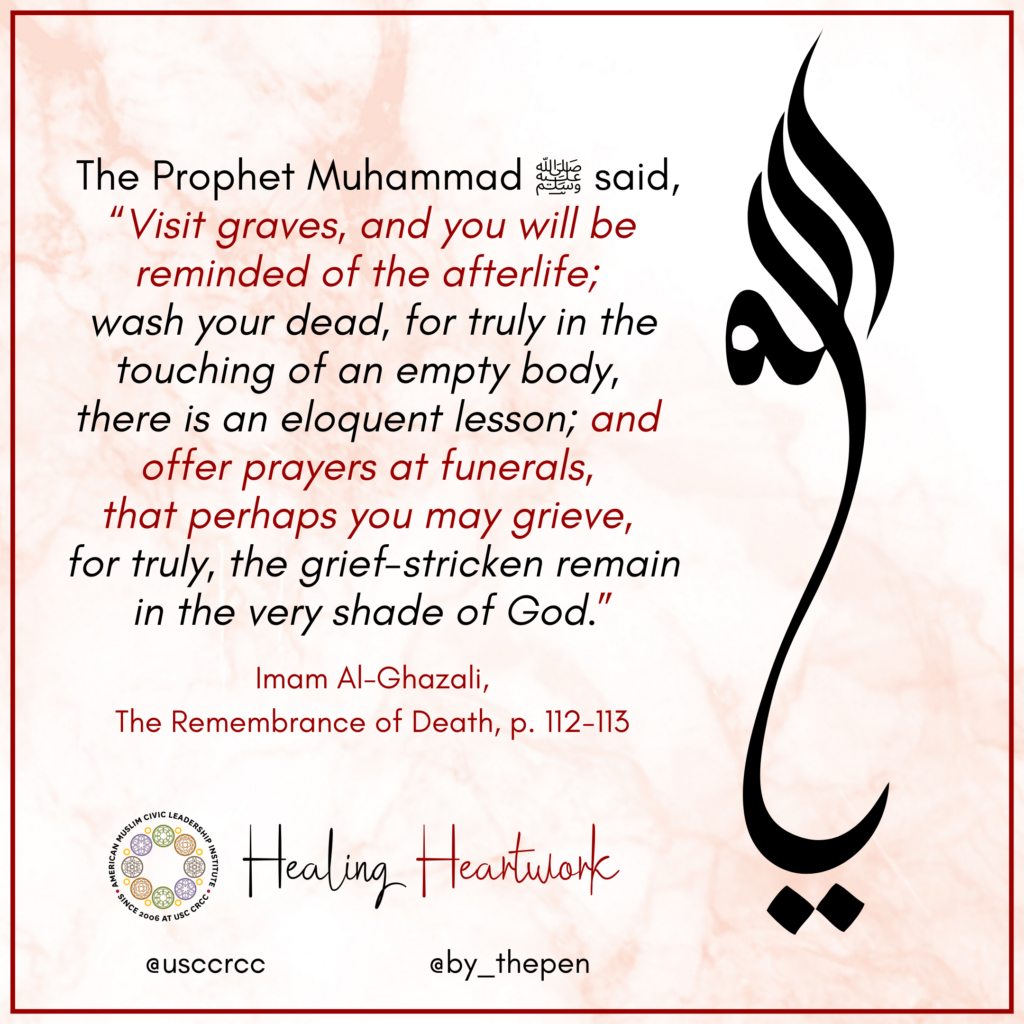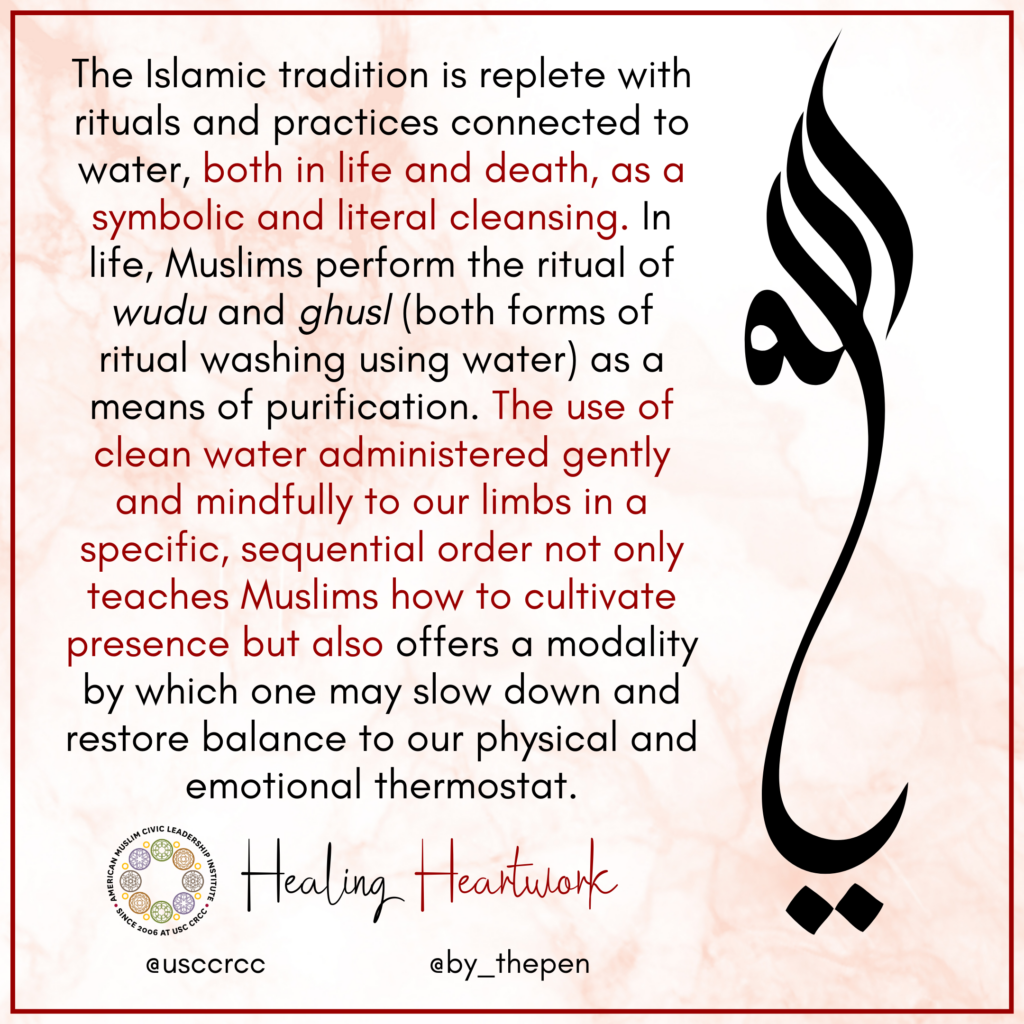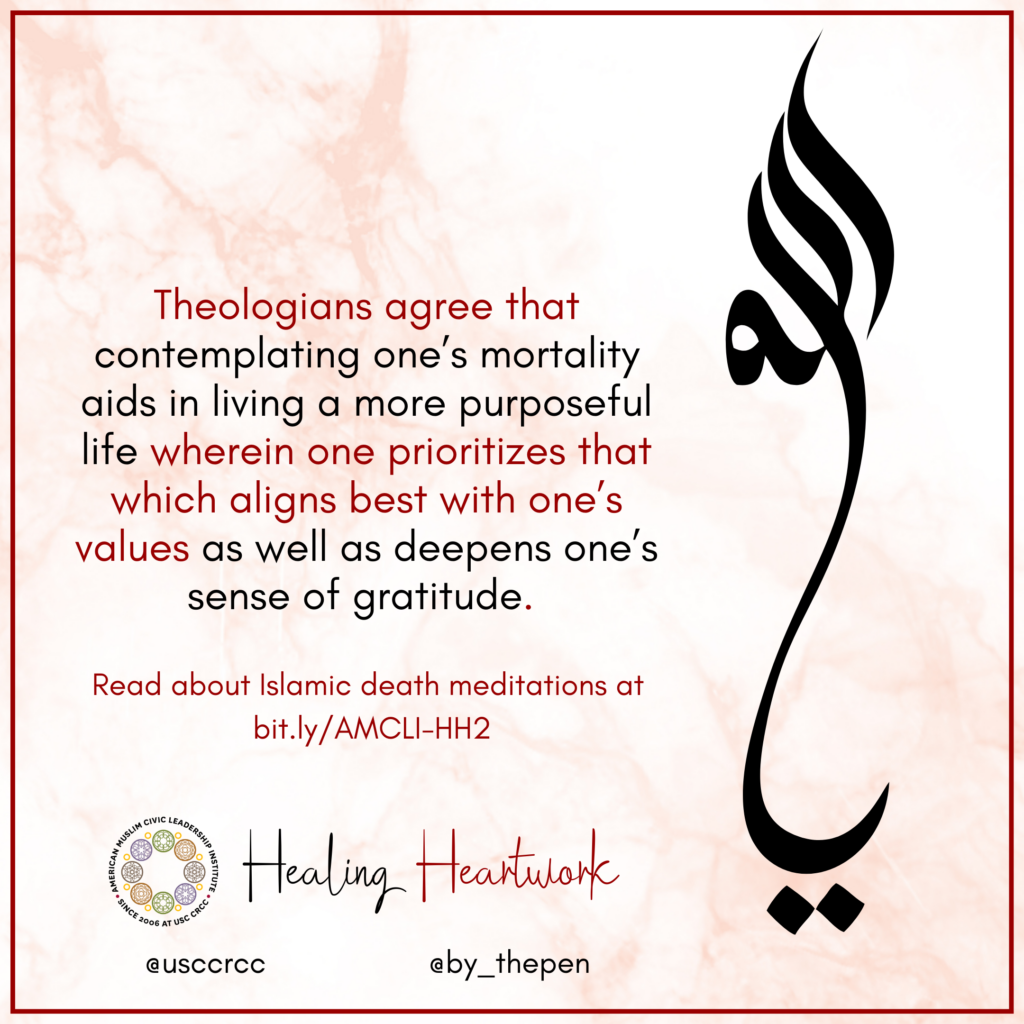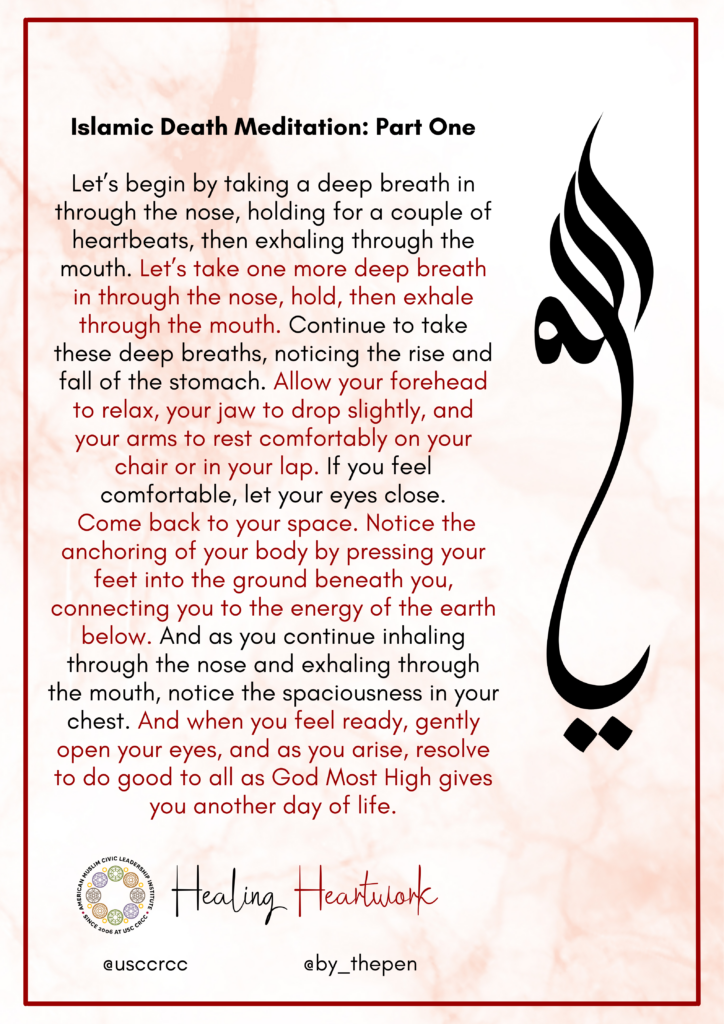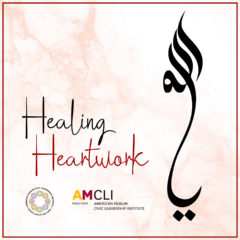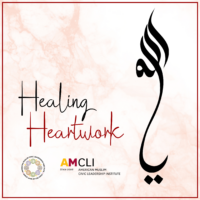In the first ten days of the month of Ramadan, the Prophet Muhammad ﷺ encouraged Muslims to focus on the quality of mercy. As we transition into this Ramadan, a period of reflection, how might we use this time to contemplate the last two years of the pandemic, weighing our losses and cradling our grief?
With a merciful eye toward creation, modeled on the way of Prophet Muhammad ﷺ whom Muslims believe is a mercy to all of existence (Qur’an Surah Al-Anbiya 21:107), how might we honor the losses we endured and will continue to endure?
In part one of “Healing Heartwork: Exploring Loss,” let us consider the healing modalities embedded in the funeral and burial rituals involving earth and water as a vehicle to explore loss.
Many spiritual communities believe that an important connection exists between our body, the earth and water. The Islamic tradition emphasizes this connection, believing that humankind began with Adam, the first human, whom God created out of clay: a mixture of earth and water. The conclusion of a Muslim’s individual existence is marked by a water-based cleanse followed by placement in a grave, wherein our physical form gradually fuses with the earth as its final act of service.
Unlike the modern approach to death—which is less of an approach and more of an avoidance—the Islamic tradition prescribes frequent remembrance of and reflection on the end of our earthly existence. Thus, the Islamic rituals surrounding death serve the main purpose of reminding the living of our eventual demise and return to God. The rituals remain a collective manifestation of the verse we utter when experiencing loss: To God we belong, and to Him we return, inna lillahi wa inna ilayhi rajiun.
The Prophet Muhammad ﷺ said, “Visit graves, and you will be reminded of the afterlife; wash your dead, for truly in the touching of an empty body, there is an eloquent lesson; and offer prayers at funerals, that perhaps you may grieve, for truly, the grief-stricken remain in the very shade of God.”
In this prophetic saying, we again notice the connection between earth (grave), water (washing) and our form—both emotionally and physically. For those of us experiencing grief, these words offer a balm for our aching hearts as the Prophet ﷺ reassures us that our anguish deepens our connection to the Divine.
Water Rituals in Islam
The Islamic tradition is replete with rituals and practices connected to water, both in life and death, as a symbolic and literal cleansing. In life, Muslims perform the ritual of wudu and ghusl (both forms of ritual washing using water) as a means of metaphysical and physical purification. The use of clean water administered gently and mindfully to our limbs in a specific, sequential order not only teaches Muslims how to cultivate presence, but also offers a modality by which one may slow down and restore balance to our physical and emotional thermostat.
In grief, for instance, hot anger may surface as part of the journey. In such occasions, a water-based ritual such as wudu may be turned to as a practice to ground ourselves as we move through the anger. While many have learned to function in the midst of grief through disassociation, wudu invites us into a slowing down process wherein we reconnect to our physical form through touch and water throughout the day. These breaks of ritual purification not only cleanse our form but also reestablish our inherent sense of dignity; as we practice wudu, we implicitly communicate to ourselves, “I give myself this act of mercy toward my body because I matter that much to Allah.”
An undeniable connection exists between our mental and spiritual well-being and our physical state of cleanliness. Islam places a high value on qualities such as cleanliness in that it underscores our value and dignity. Grief takes a heavy toll on our ability to care for ourselves, and showing one’s self mercy through our sense of worth augments the healing journey. The Prophet Muhammad ﷺ desired to have his face washed with water and his mouth cleaned with a miswak brush on his deathbed, teaching us about upholding the dignity of a person during a time when one might assume such a practice would no longer matter. Islam also centers water in the body’s last earthly experience. Immediately after death, when one’s ability to wash oneself ceases, Muslims trust in an inner circle of people who step in to perform this ritual of washing through ghusl al mayyit. In this ritual, one’s spouse, child(ren), parent or loved one perfumes lukewarm water with lote tree leaves and camphor before administering it to every part of the deceased’s body–again, in sequential, specific order. Those performing the wash then cover the body in a perfumed white burial shroud, called a kafan, out of further respect for the deceased’s privacy and dignity.
Imagine the healing effects of this washing of ghusl al mayyit on the one performing the ritual. How beautiful a gift to offer our loved one for the last time, sending them back to the earth and to their Creator in the cleanest state possible and to be able to savor that last touch of our loved one while listening to the gentle trickle of water as it is poured over every limb. The pandemic led to many missed opportunities to perform ghusl al-mayyit for Muslim communities around the world, but there may be an opportunity to reconnect with the precious memory of our deceased loved one every time we approach wudu or ghusl or other water-based rituals for ourselves. Ritual serves as a connection point between our present, past and future.
Earth-Based Rituals in Islam
The parallels between water and earth rituals become apparent in prescriptions for how to perform wudu in the absence of clean water. Under these circumstances, Muslims may use dirt or dust from the earth as a purifying medium through the practice of tayammum. In Islam, connection to the earth offers Muslims many opportunities for mercy and healing. From the earth, Muslims believe we absorb replenishing metaphysical energy, known to us by the teaching of the Prophet ﷺ that states that the entire earth remains a place of prayer (Sunan al-Tirmidhī 317). The earth also plays an important function in our transition back to our Creator. In Islam, the deceased is laid to rest directly in the earth without a coffin—no barrier interferes with our physical form fusing with the earth, contributing to the life of its organisms, giving our existence purpose up until the very end.
After the funeral, the living interact with the earth, too, with the option of throwing small handfuls of dirt atop the grave while reciting the Quranic verse,
“From this very earth We created you and to the same earth We shall cause you to return, and from it We shall bring you forth to life again” (Qur’an Surah Ta-Ha 20:55).
The practice serves to remind those remaining of their ultimate destination. In this symbolic practice, we find healing as well. It can provide us with a way of feeling purposeful at a time when grief may overwhelm us and with a way of saying “see you later” rather than “goodbye.” Muslim teachers often remind their students, we come into this world wrapped in a shroud and handed to a loved one, and we exit this world with our loved ones wrapping us in a shroud and metaphorically handing us back to our Beloved Creator.
Islamic Death Meditation I
Based on the writings of Imam Abu Hamid Al-Ghazali in his book, Faith and Practice
A note on death meditations: Many Muslim scholars and sages practiced regular meditations on death to visualize one’s own journey at the end of life for the purposes of spiritual development. Imam Abu Hamid al-Ghazali, theologian and mystic philosopher of the 12th century, famously wrote and practiced death meditations, the inspiration of which directly informs and revives this ritual for our use this Ramadan season.
Theologians of various faith traditions and philosophies agree that contemplating one’s mortality aids in living a more purposeful life wherein one prioritizes that which aligns best with one’s values as well as deepens one’s sense of gratitude. In the midst of a pandemic, death meditations may help in alleviating a sense of fear toward our inevitable end by providing us with an opportunity to imagine ourselves in this realm of the unknown. Death meditations also create a space for us to sincerely reflect on our life, our relationships with others and, most importantly, our relationship with the Divine. We can then assess which aspects of our lives need our attention.
Listen to the meditation on YouTube or SoundCloud, or read it below:
We begin with Bismillah Al-Rahman Al-Raheem, in the name of God, the Most Gracious, the Most Compassionate.
Optional addition: I invite you to find a comfortable position. Let’s begin by taking a deep breath in through the nose, holding for a couple of heartbeats, then exhaling through the mouth. Let’s take one more deep breath in through the nose, hold, then exhale through the mouth. Continue to take these deep breaths, noticing the rise and fall of the stomach. Allow your forehead to relax, your jaw to drop slightly, and your arms to rest comfortably on your chair or in your lap. If you feel comfortable, let your eyes close.
Death is a natural return to our Beloved Creator. As Muslims, we believe that we die a “small death” every night, based on the teaching of the Prophet Muhammad ﷺ, who stated that sleep is the brother of death and on the Quranic verse, “It is Allah Who takes the souls at death and the soul of the one, who has not yet died, during sleep” (Qur’an Surah Az-Zumar 39:42). An Arab poet famously captured this sentiment, writing, “Sleep is a small death, and death is a long sleep.” Ironically, though, we need sleep in order to live fully. Sleep serves as an important healing modality.
Together, let’s experience a new sleep ritual based on the spiritual connection between sleep and death by imagining our resting place in the grave. As you imagine sliding into your comfortable and safe bed, position yourself such that your feet point toward the qibla, the same way your body will be placed in the grave. Next, rest your body on your right side, the side on which the deceased reclines in the grave. Now imagine that thousands upon thousands of warm, twinkling lights slowly surround you. These lights symbolize all of the good deeds you offered in life. Around your head, the lights from all the verses of the Qur’an you’ve recited or heard come forward. Around your feet, the lights from all the times you’ve stood in prayer approach. And around your hands, the lights from all the times you’ve given charity and made duaa and comforted somebody emerge. And from your mouth, the lights from all the times you’ve made dhikr and fasted come forward.
As you lay there, basking in the warm and welcoming glow of your good deeds, prepare your soul to meet God by asking for forgiveness for your spiritual struggles. We never know when our time will come to an end, so let’s prepare from now: Repent of your faults, seek pardon, resolve not to return to your sin, and so sleep.
Optional addition: Come back to your space. Notice the anchoring of your body by pressing your feet into the ground beneath you, connecting you to the energy of the earth below. And as you continue inhaling through the nose and exhaling through the mouth, notice the spaciousness in your chest. And when you feel ready, gently open your eyes, and as you arise, resolve to do good to all as God Most High gives you another day of life.
The Healing Heartwork Toolkit: Exploring Loss is a collaboration between AMCLI and Chaplain Sondos Kholaki.
Chaplain Sondos Kholaki is an AMCLI fellow and guest contributor with the USC Center for Religion and Civic Culture.

